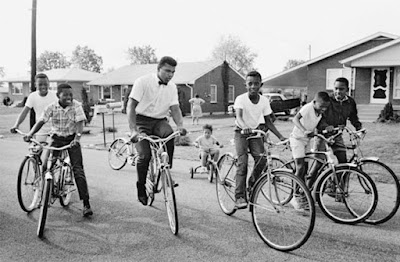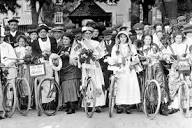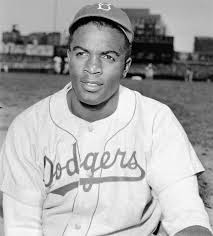But even if not for its price tag, its disappearance would leave its owner devastated. Especially given that the boy had just gotten the brand-new Schwinn as an early Christmas gift, and it was in his favorite color--red.
Said boy went, with his buddy, into Columbia Auditorium in Louisville, KY---according to some accounts, for the free popcorn inside. When they returned, they had two more cartons of popcorn, but two fewer bikes, between them.
Enraged, the boy reported the crime to a policeman, one Sergeant Joe Martin. In recounting his loss, the boy vowed to "whup" the perp.
Sergeant Martin's life experience and wisdom came into play. He advised the boy bereft of bike to learn how to fight before confronting a bicycle thief.
Sergeant Martin was something of a Renaissance man. While off-duty, he was, among other things, a boxing trainer.
By now, you may have figured out where this story is going. The 12-year-old boy was known as Cassius Clay.
Yes, that Cassius Clay. The one who would, a half-dozen years later, win the gold medal in the 1960 Rome Olympics. And, three and a half years later, a heavily-favored named Sonny Liston--who looked like someone you wouldn't even want to meet in a seminary, let alone in a dark alley-- would not answer the bell after the seventh round. The handsome, brash Clay thus became the second- youngest heavyweight champion in history: a distinction he would hold for more than two decades, until Mike Tyson defeated Trevor Berbick.
Shortly after defeating Liston, Clay converted to Islam under the tutelage of Malcolm X. He would follow his mentor in renouncing his "slave name" and become Cassius X, and, not long after, adopt the name by which we mourn him today: Muhammad Ali.
 |
| Malcolm X photographs Muhammad Ali from behind a soda fountain counter in Miami shortly after Ali (then Cassius Clay) defeated Sonny Liston for the World Heavyweight Title. |
What I know about boxing can fill this sentence. All right, I take that back: I grew up hearing a lot about it, and even watching fights--which, in those days, were on regular network TV, in prime time no less. You see, my grandfather loved boxing. And his brother-in-law--my great-uncle, on my father's side--was a prizefighter in his youth. I was told he was an early Gold Gloves champion as a bantamweight or welterweight (he was indeed diminutive), although I have not been able to verify this.
Both my grandfather and my great-uncle acknowledged Ali's greatness as a fighter, though both continued to refer to him as Cassius Clay. My grandfather did so for the reasons you might expect of a white man of his place and time, but my great-uncle actually knew Clay, somewhat, before he became Ali. He always said Clay/Ali was indeed "the greatest"--of this generation, he added--but nobody was, or would be a better heavyweight fighter than Joe Louis. (And, he once said, nobody was a better man than Jackie Robinson.)
Whatever. Ali was certainly the greatest fighter I ever saw, for what that's worth. But more to the point, if I had children, I would tell them to look to him as one of their role models. (Kids should not have only one role model.) He stood for what he believed in, even when it cost him--in his case, nearly four years in the prime of his career. Imagine what that career would have been like had he not been banned from fighting during those years because he refused to fight in the Vietnam War!
And, let's face it, the man had a personality that transcended everything he did, whether as an athlete or a human-rights activist. He was often accused of "showboating". I don't think that's fair or true. Rather, I think he was born to be in the spotlight, and he couldn't have done anything to change it. Some years ago, I recall a photographer or news producer--I forget which, and I forget whom--saying something to the effect that it was impossible to take a bad picture of Ali.
It wasn't just his looks, though few young men were ever looked better. Even the word "charismatic" almost trivalizes the qualities he had. Whatever word or words do him justice, he was born to be a beacon or a lightning rod. And he was both. If that's not a full life--one that ended just after midnight this morning--I don't now what is.
As for whoever stole 12-year-old Clay/Ali's bike all of those years ago: He or she might well be the only bike thief (or one of the few bike thieves) who changed the world for the better.
Wow! I never thought I'd say anything like that.
R.I.P. Muhammad Ali






















